In Germany, beekeeping holds immense importance due to its significant contributions to agriculture and biodiversity. In Germany, around 700,000 bee colonies are cared for by almost 100,000 beekeepers. It is the art and science of raising honeybees for their valuable products, such as honey, beeswax, and pollen. As a beekeeper in Germany, you become part of a vital network that supports pollination and helps maintain biodiversity.
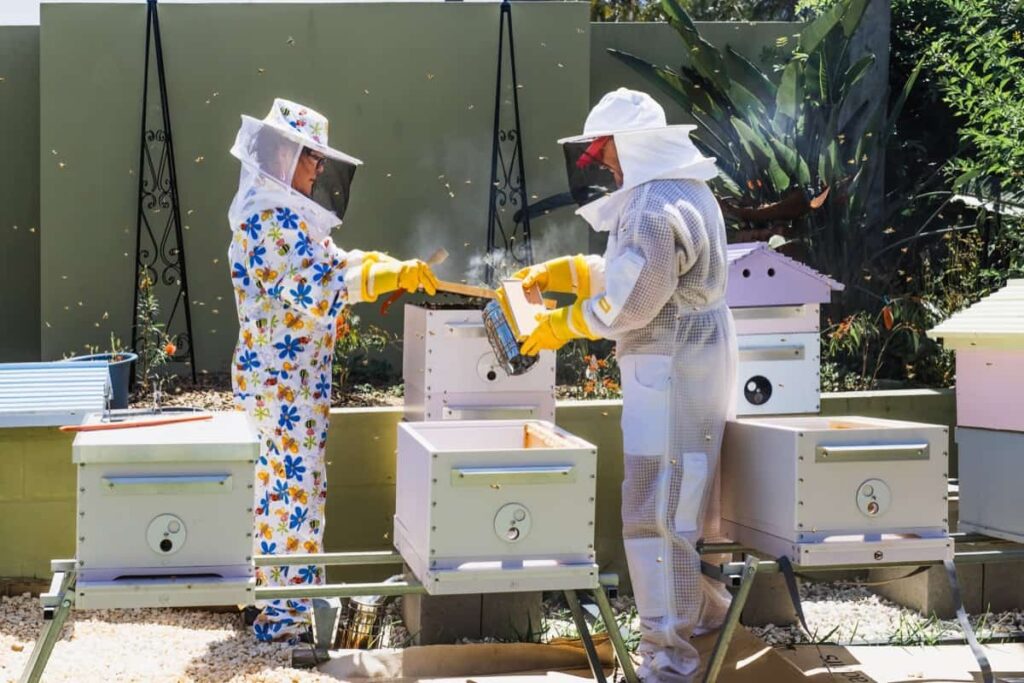
Different Types of Bees in Germany
One popular type of bee in Germany is the Carniolan bee. Known for their gentle temperament and ability to adapt to different climates, beekeepers seek Carniolan bees. They are also known for their rapid spring build-up and resistance to pests and diseases. Another type of bee in Germany is the Buckfast bee. These bees were bred specifically for productivity, disease resistance, and docility. Buckfast bees are known for their high honey production and calm nature, which makes them ideal for beginner beekeepers.
German Black bees have been native to Germany since ancient times. They adapt well to the local climate but can be more aggressive than other breeds. However, they have excellent foraging abilities and show good resistance against certain diseases. Italian honeybees are also prevalent in German apiaries due to their gentle nature. They thrive in warmer climates but may require additional care during colder winters.
14 Steps to Start Beekeeping in Germany
Choosing the Right Location for Your Beehives in Germany
The success of your beekeeping venture in Germany largely depends on this factor, as it directly affects the health and productivity of your bees. Firstly, consider the availability of nectar and pollen sources in the area. In Germany, numerous flowering plants can provide ample sustenance for bees. Another important aspect of starting beekeeping in Germany is accessibility.
You want to choose a location that allows easy access for yourself and your bees. Furthermore, consider environmental factors such as wind patterns and exposure to sunlight. Additionally, ensure that there is a water source nearby. Bees require water for various activities within their hive, including cooling down during hot weather and diluting honey stores when needed. Selecting an area away from heavily polluted regions will help safeguard their health.
Researching and Developing a Business Plan for Beekeeping in Germany
Conduct a business plan through market research to understand the demand for honey and other bee products in Germany. Identify potential customers such as local consumers, farmers markets, health food stores, or even restaurants that prioritize using locally sourced ingredients. Next, determine your target production level based on available land and resources.
In case you missed it: Advancing Sustainable Agriculture through Germany Greenhouse Farming
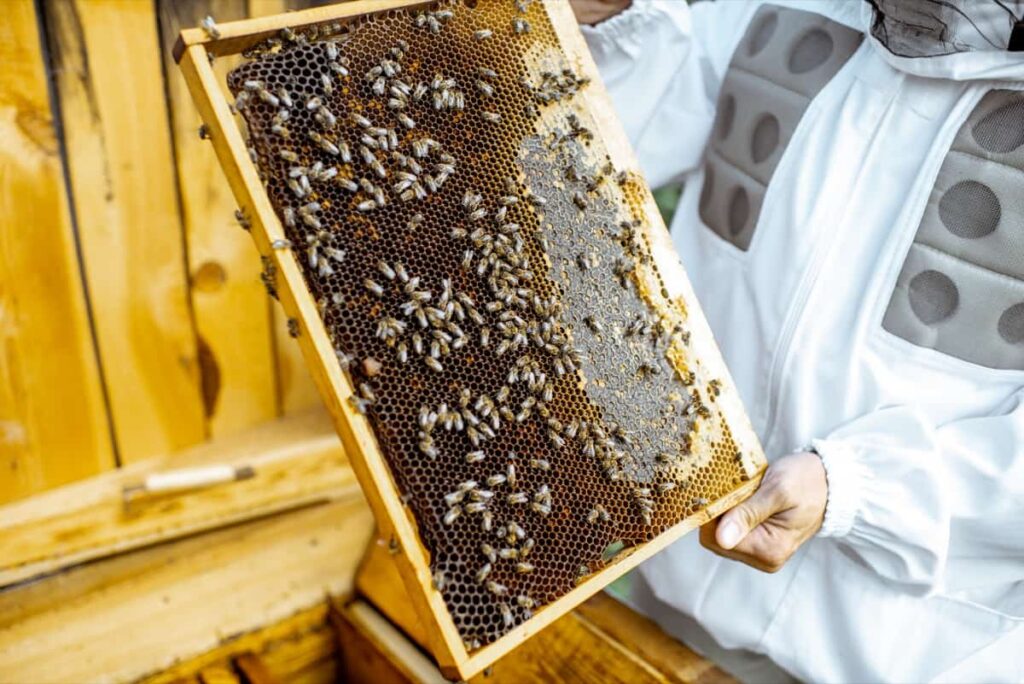
Consider the type of bees you will keep and estimate how many hives you can manage effectively. Create a detailed financial plan once you understand the market and production capabilities. Additionally, consider environmental factors that may impact your beekeeping operation, such as weather patterns or nearby agriculture practices that could affect pollen availability.
Obtaining the Necessary Licenses and Permits for Beekeeping in Germany
To begin beekeeping in Germany, you must identify the specific licenses and permits required in your area. This may vary depending on your location within Germany, so it’s crucial to check with your local agricultural authority or beekeeping association. Next, you must apply for these licenses and permits to start beekeeping in Germany.
This typically involves providing information about your proposed beekeeping operation, such as the number of hives, their location, and any relevant certifications or training you’ve completed. They may conduct site visits or request additional documentation before approval. Once you have obtained all necessary licenses and permits to start beekeeping in Germany, keep them readily accessible at your beekeeping site, as they may be subject to inspection at any time.
Estimating the Initial Costs of Starting a Beekeeping Venture in Germany
Starting a beekeeping venture in Germany requires careful planning and consideration, especially when estimating the initial costs. While the exact expenses may vary depending on factors such as scale and location, here are some key aspects to consider. You need to invest in quality beehives and equipment.
Additionally, sourcing honeybee colonies is essential to start beekeeping in Germany. The cost of acquiring bees can vary based on factors such as colony size or whether you choose packaged bees or nucleus colonies. Another significant expense is purchasing feed for your bees when natural food sources are scarce. Other costs include obtaining necessary licenses and permits from local authorities. These fees might differ depending on the region where you plan to operate your beekeeping business.
Selecting and Purchasing the Appropriate Beekeeping Equipment in Germany
First, you must invest in protective gear, such as a beekeeper’s suit, gloves, and a veil. Next, you’ll need to consider hive components. This includes beehive boxes, frames, foundations, inner covers, outer covers, and bottom boards. In addition to hive components, you’ll also need tools to start beekeeping in Germany.
In case you missed it: 15 Steps to Start Honey Bee Farming in UAE: Types of Bees and Beekeeping Business Plan
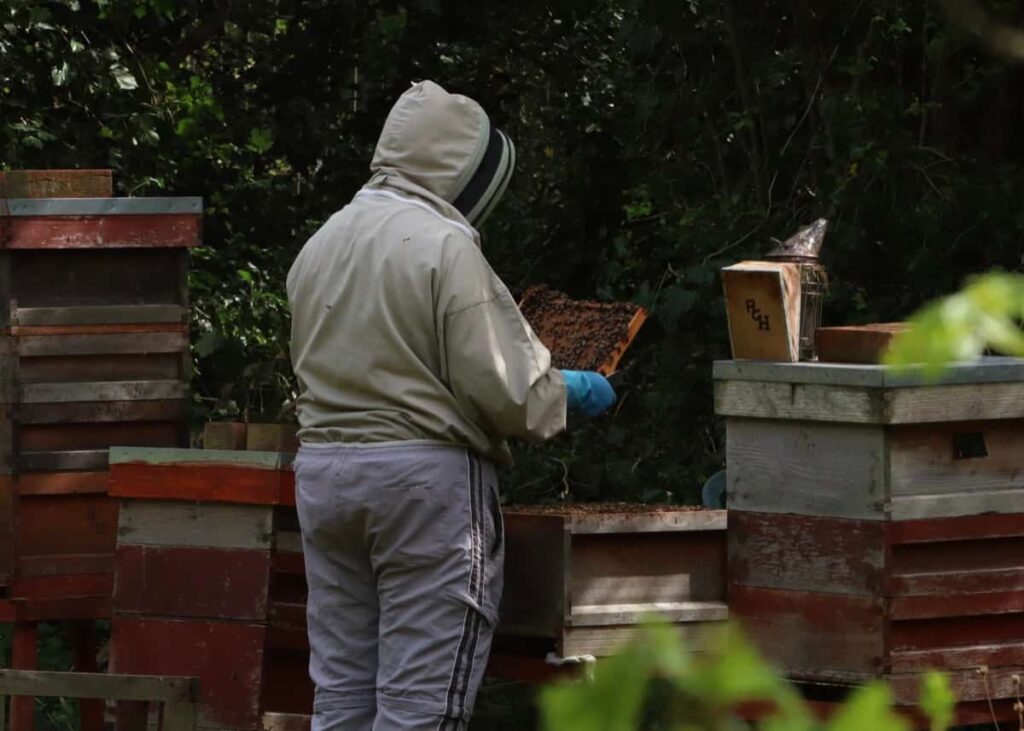
Some essential tools include a smoker for calming bees during inspections or honey harvesting, a hive tool for prying apart frames, and a brush for gently removing bees. When selecting beekeeping equipment suppliers in Germany, choosing reputable companies known for their quality products is advisable. Consider reading reviews or seeking recommendations from experienced beekeepers.
Sourcing and Acquiring Honeybee Colonies in Germany
One option is to purchase established colonies from local beekeepers or apiaries. This can be a convenient way to get started, as you will have bees already accustomed to the German climate and conditions. Another option is catching swarms or capturing wild colonies. This can be an exciting and cost-effective method.
You may also consider buying packages of bees with a queen included. These packages typically consist of around 10,000 worker bees and a mated queen. Packages are usually imported from other countries, so they comply with any regulations regarding bee imports. Inspect them carefully before purchasing, looking for signs such as active brood production and overall vitality.
Setting Up and Assembling Your Beehives in Germany
First, you’ll need to decide on the type of hive you want to use. The most common beehive type in Germany is the Langstroth hive, which consists of stacked boxes with removable frames for easy inspection. Once you have chosen a hive design, it’s time to assemble it. Follow the manufacturer’s instructions carefully, ensuring all parts fit together securely. Ensure there are no gaps or cracks where pests or predators could enter.
Next, choose a suitable location to start beekeeping in Germany. They should be placed in an area with ample sunlight and good airflow but protected from strong winds. Avoid locations near sources of pesticides or other potential contaminants. Before introducing bees into the hive, make sure it is properly prepared. This includes adding foundation wax sheets or starter strips to guide comb construction by the bees. Handle each frame carefully to avoid injuring the bees or damaging their brood or honey stores.
Providing Adequate Nutrition and Water Sources for Your Bees in Germany
One way to ensure adequate nutrition is by planting various flowering plants around your apiary. This will provide nectar and pollen, essential for the bee larvae growth. Consider including lavender, sunflowers, borage, and clover plants in your garden or nearby fields. Water is another essential requirement for bees. Remember that providing adequate nutrition and water sources should be ongoing throughout the seasons. Doing so will help maintain strong colonies that can better resist diseases and pests while producing high-quality honey.
In case you missed it: Backyard Beekeeping Cost and Tips for Reducing Backyard Beekeeping Costs
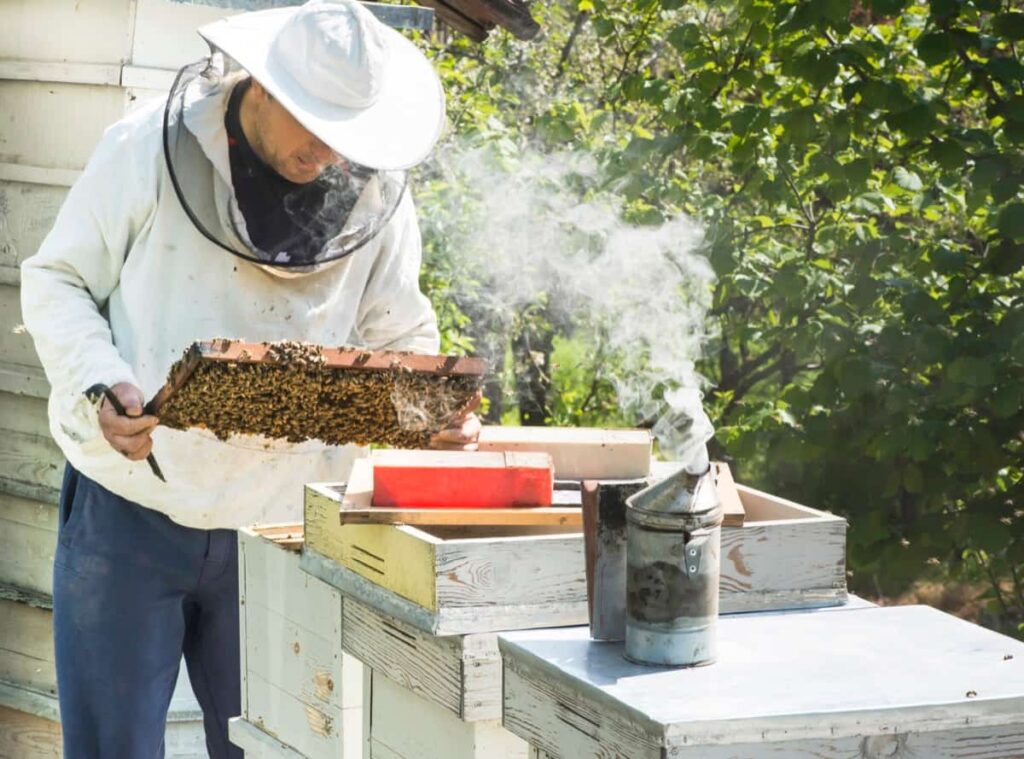
Understanding and Managing Bee Diseases and Pests in Germany
One common disease that affects bees in Germany is Varroosis, caused by the parasitic mite Varroa destructor. This mite weakens bees by feeding on their hemolymph, transmitting viruses, and compromising their immune system. Another prevalent issue in German beekeeping is American Foulbrood (AFB), a bacterial infection that can devastate hives if left untreated. Recognizing the signs such as foul-smelling brood larvae is crucial, as infected colonies must be destroyed to prevent further spread.
In addition to diseases, pests like wax moths and small hive beetles can also pose problems for beekeepers in Germany. Maintaining a clean hive environment with proper ventilation helps minimize these issues. To effectively manage bee diseases and pests, staying updated on research findings and attending workshops or seminars offered by local associations can provide valuable knowledge. Implementing integrated pest management strategies while following legal requirements ensures responsible treatment practices without harming bees or the environment.
Learning the Basics of Hive Inspection and Maintenance in Germany
As a beekeeper, it is crucial to regularly inspect and maintain your beehives to ensure their health and productivity bees. Certain practices can help you effectively manage your hives to start beekeeping in Germany. Make sure to schedule regular hive inspections throughout the year. Maintaining proper ventilation is also important for hive health. Regularly clean out debris from the bottom board and remove dead bees inside the hive. You must attend a beekeeping course or training program to acquire a license to start beekeeping in Germany.
Harvesting Honey and Other Bee Products in Germany
In Germany, bees typically produce honey when nectar sources are abundant in summer. It’s important to wait until your honey frames are at least 75% capped before extracting them from the hive. This ensures that the moisture content is just right for long-term storage. You’ll need a few essential tools, such as an uncapping knife or fork, a honey extractor, and strainers or filters to extract honey.
Place the uncapped frames in a centrifugal extractor and spin them quickly to separate the honey from the comb. Once extracted, strain your freshly harvested honey through fine mesh filters to remove any impurities or debris. Then, transfer it into clean jars or bottles for storage or sale. In addition to honey, beekeepers in Germany can harvest other valuable bee products such as beeswax and propolis. Remember that sustainable harvesting practices are essential for ensuring healthy bee colonies.
Marketing and Selling Your Bee Products in Germany
Marketing and selling your bee products in Germany are essential to ensure beekeeping success. One effective way to market your bee products is through online platforms such as social media and e-commerce websites. Participating in local farmers’ markets or food fairs can provide valuable opportunities for face-to-face customer interaction.
In case you missed it: 11 Best Beekeeping Suits for Men and Women: Prices Included for Beekeepers in the USA
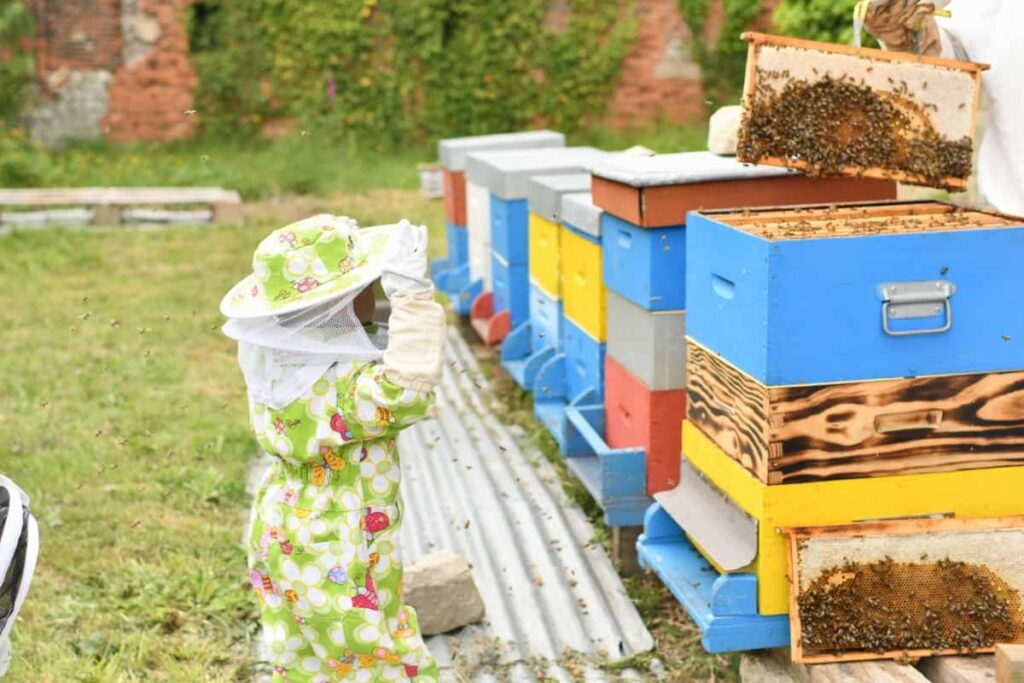
Another important aspect of marketing to start beekeeping in Germany is packaging design. To maximize sales, consider offering various sizes or packaging options for different target audiences. Furthermore, establishing partnerships with local businesses such as health food stores or gift shops can expand your distribution channels.
Networking with Local Beekeeping Associations and Communities in Germany
Networking with local beekeeping associations and communities is important for starting and growing your beekeeping venture in Germany. These organizations provide valuable resources, support, and knowledge-sharing opportunities for novice and experienced beekeepers. Joining a local association allows you to connect with fellow beekeepers who understand the challenges and joys of this unique hobby or business.
Attending association meetings, workshops, and conferences gives you access to educational programs to enhance your beekeeper skills. By networking with other local beekeepers, you may discover potential collaboration opportunities such as joint honey sales or shared equipment purchases. Affiliated with the German Beekeepers Association, it gives you access to exclusive resources such as publications on hive management techniques or information about local regulations about beekeeping.
Additionally, joining a local association often provides access to mentorship programs where experienced members offer guidance and advice tailored specifically to your needs. They can help troubleshoot problems you encounter along the way or assist in expanding your business through their network of connections.
Continuing Education and Staying Updated on Beekeeping Practices in Germany
One way to stay informed is by attending workshops and seminars organized by local beekeeping associations or educational institutions. These events provide valuable insights from experienced beekeepers and experts who share their knowledge and techniques.
Additionally, online resources such as forums, blogs, and webinars can be excellent sources of information. Joining professional networks like the German Beekeepers Association provides an opportunity to connect with other beekeepers at both regional and national levels. These networks often organize training programs specifically designed for continuing education.
Beekeeping Course in Germany
In a beekeeping course in Germany, you’ll learn about various topics related to beekeeping, including hive management, honey production, pest control, and disease prevention. You’ll gain hands-on experience handling bees and be taught to maintain healthy hives throughout the seasons. Attending a beekeeping course enhances your understanding of bees and helps build confidence as you embark on your apiary venture.
Several institutions offer comprehensive beekeeping courses in Germany for beginners and experienced individuals. These courses provide valuable knowledge about bee biology, hive management, disease prevention, and honey production techniques. They also teach you how to handle bees safely and responsibly.
In case you missed it: Honeybee Farming Operations Management: Month-Wise Beekeeping Maintenance for Better Profits
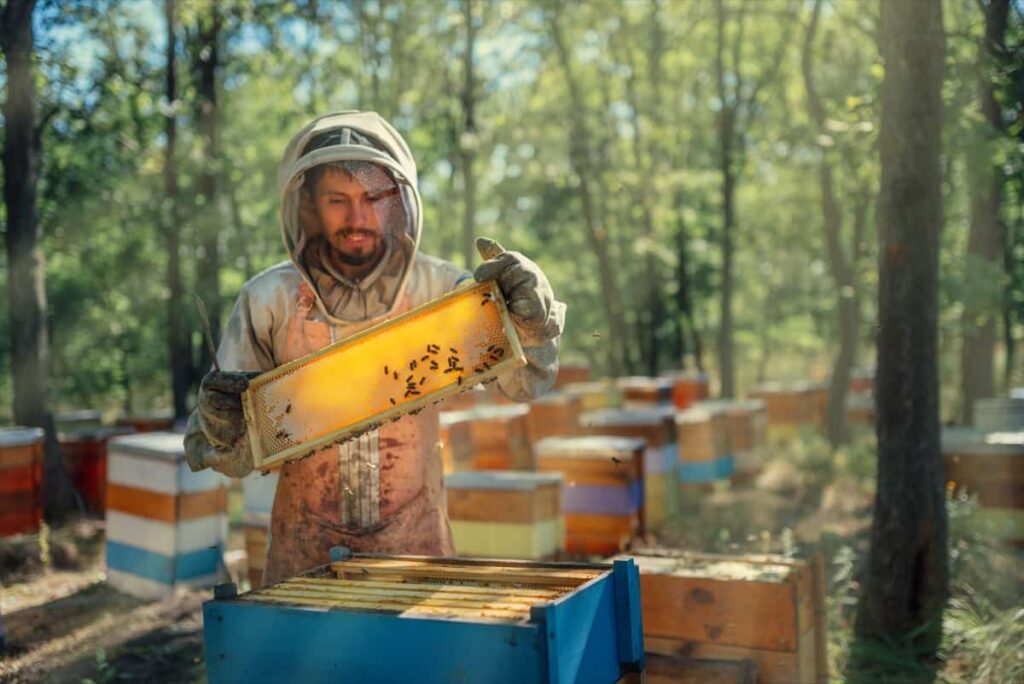
Summary of Beekeeping in Germany
| Steps | Steps to Start Beekeeping | Description |
| Step 1 | Researching and Developing a Business Plan | Identify your goals, target market, and estimate costs |
| Step 2 | Obtaining the Necessary Licenses and Permits | Check with local authorities for specific regulations |
| Step 3 | Estimating Initial Costs | Invest in quality beehives, equipment, honeybee colonies, necessary licenses and permits. |
| Step 4 | Choosing the Right Location | Select a location that allows easy access for both yourself and your bees |
| Step 5 | Purchasing Beekeeping Equipment | Invest in high-quality equipment like hive bodies, frames, smokers, feeders, queen excluders, and hive tools. |
| Step 6 | Sourcing Honeybee Colonies | Reputable sources such as local breeders or established apiaries |
| Step 7 | Setting Up & Assembling Beehives | They are sturdy and well-ventilated while providing secure shelter for bees against predators. |
| Step 8 | Providing Adequate Nutrition & Water | Apply adequate nutrition throughout the year and provide clean water sources such as birdbaths or shallow containers. |
| Step 9 | Managing Bee Diseases and Pests | Implementing integrated pest management strategies. |
| Step 10 | Hive Inspection and Maintenance | Schedule regular hive inspections and maintain proper ventilation. |
| Step 11 | Harvesting Honey | Bees typically produce honey in summer. |
| Step 12 | Marketing and Selling | Marketing through online platforms like social media. |
| Step 13 | Local Beekeeping Associations | Attending association meetings, workshops, and conferences. |
| Step 14 | Continuing Education | Attending seminars and joining professional networks like the German Beekeepers Association. |
Conclusion
Bees are essential pollinators that facilitate the reproduction of plants by transferring pollen. Moreover, beekeeping promotes biodiversity in Germany’s natural landscapes. Additionally, starting beekeeping in Germany allows us to contribute towards global efforts to conserve honeybee populations.
- Crops Grown in Summer Season: Best Choices for Summer Gardening
- Organic Pest Control for Tomato Farming
- How to Maximize Sheep Farming Profit
- Broccoli Varieties: Choosing the Right Cultivars for Your Farm
- How to Raise Pigs in Your Own Backyard: A Comprehensive Guide
- Budget Friendly Sheep Shed Ideas: Cheap and Low-Cost Tips
- How Much Do Cattle Farmers Make: Revenue Streams in Cattle Farming
- Management Pests and Diseases in Your Cotton Field
- Sheep Farming Business Plan for Beginners
- Aquaponic Farming at Home: A Step-By-Step Guide
- Profitable Village Farming Business Ideas in 2024
- High-Yield Aquaculture: Fast-Growing Fish for Farming
- Effective Fish Pond Construction Techniques for Beginners
- Irrigation and Water Management in Pineapple Farming
- Blossom to Harvest: Mastering Flowering and Pollination in Papaya Farming
- Pig Fattening Essentials: From Selection to Sale for Beginners
- Raising Wagyu Cattle: A Complete Guide for Premium Beef Production
- Soil Types and Their Water Holding Capacity
- Optimizing Irrigation Schedules for Coconut Groves for Enhanced Yield
- Espresso Your Garden: Coffee Grounds for Healthier Acid-Loving Plants
- The Best Soil Mix for Snake Plants: How to Mix Your Own Snake Plant Soil
- Green Thumb Success: Expert Tips for Cultivating Greenhouse Beans All Year Round
- Bloom All Year Round: The Ultimate Guide to Indoor Hyacinth Care
- Eco-Friendly Gardening: How to Make Liquid Fertilizer from Kitchen Waste
- Ultimate Guide to Grow Anise in Pots: Explore Seed Propagation to Harvesting
- Guide to Raising Chester White Pigs: Discover Breed Facts to Growth Management
- Mastering the Elegance: The Ultimate Guide to Weeping Cherry Tree Care, Planting, and Maintenance
- Ultimate Guide to Planting Garlic in Grow Bags: Growing Strategies for Beginners
- How to Fix Spider Plant Leaf-Related Problems: Natural and Organic Remedies
- 10 Reasons Why Your Tulsi Plant is Shedding Leaves: Home Remedies and Solutions
- Optimizing Growth and Yield: The Advantages of Palm Bunch Ash Fertilizer
- Utilizing Neem Oil Extract as a Natural Pesticide for Hydrangea
- From Soil to Harvest: Various Ways in Which Farmers Can Use AI Tools
- Steps to Encourage and Induce Citrus Flowers: A Comprehensive Guide
- How to Fix Snake Plant Leaf-Related Issues: Natural and Organic Remedies
- Transform Your Garden into a Fragrant Oasis with Raat Ki Rani (Night Blooming Jasmine)
